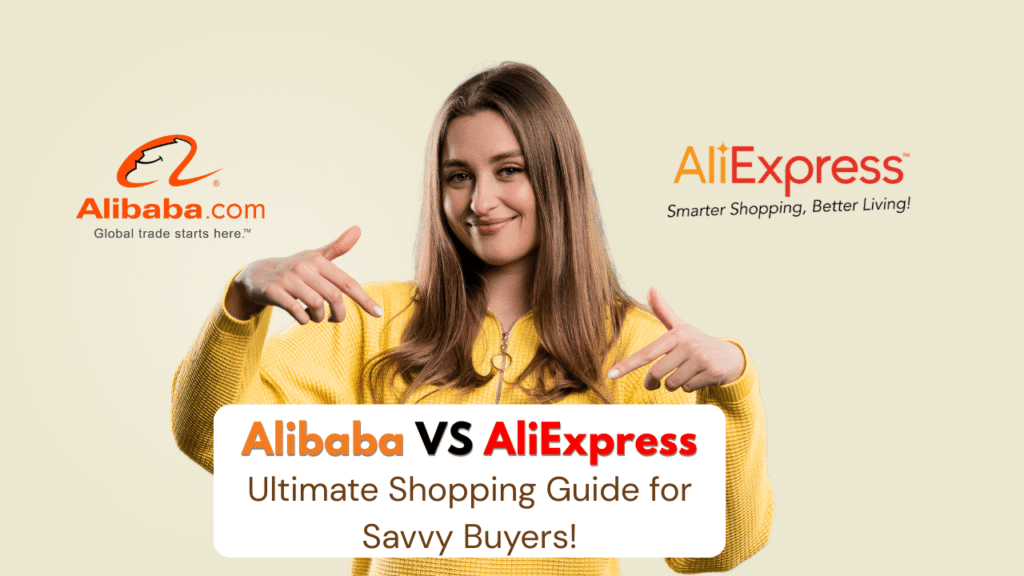
Alibaba and AliExpress stand as the top marketplaces for global online shopping and product procurement. The Alibaba Group manages two platforms that serve different markets through unique functions.
Common Questions
Many consumers and entrepreneurs struggle to understand the operational distinctions between Alibaba and AliExpress. People commonly ask:
- Is Alibaba the same as AliExpress?
- Is AliExpress the same as Alibaba?
- Does Alibaba own AliExpress?
- Who owns AliExpress?
- Is AliExpress Chinese?
This comprehensive guide provides correct answers to your questions through factual information and a comparison table while offering real-world case insights to help you choose the best-suited platform.
The Truth Revealed: Is Alibaba the Same as AliExpress?
Alibaba and AliExpress operate under shared ownership but serve different functions as distinct platforms. They utilize distinct business models and user processes because they each serve separate target markets.
Business Models
As a B2B marketplace, Alibaba enables wholesalers, distributors, and businesses to make bulk purchases of products at lower prices. AliExpress operates as a business-to-consumer marketplace that supplies products and services to individual buyers and dropshipping businesses.
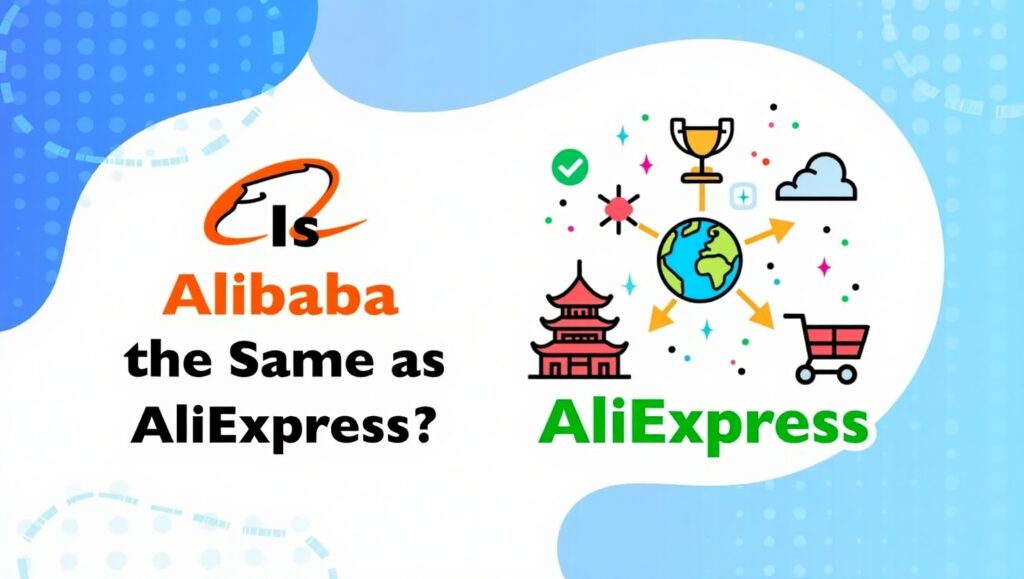
User Engagement
Users of Alibaba typically engage in purchase negotiations and ask for price estimates but often face minimum order quantity requirements. Users can purchase products in bulk and acquire custom-manufactured items along with white-label services through the platform. AliExpress enables consumers to make immediate purchases without requiring minimum order quantities because the product prices are transparently displayed.
The main difference between these platforms creates distinct shopping environments since they both link buyers to suppliers but operate with divergent fundamental goals.
Shocking Similarities and Key Differences: Is AliExpress the Same as Alibaba?
The outcome differs when you reverse the question since the answer remains unchanged. AliExpress functions separately from Alibaba despite their shared parent company ownership.
Shipping worldwide and providing extensive product categories, along with seller profiles, exist on both platforms. However, the user experience, shipping logistics, and order processing set them apart.
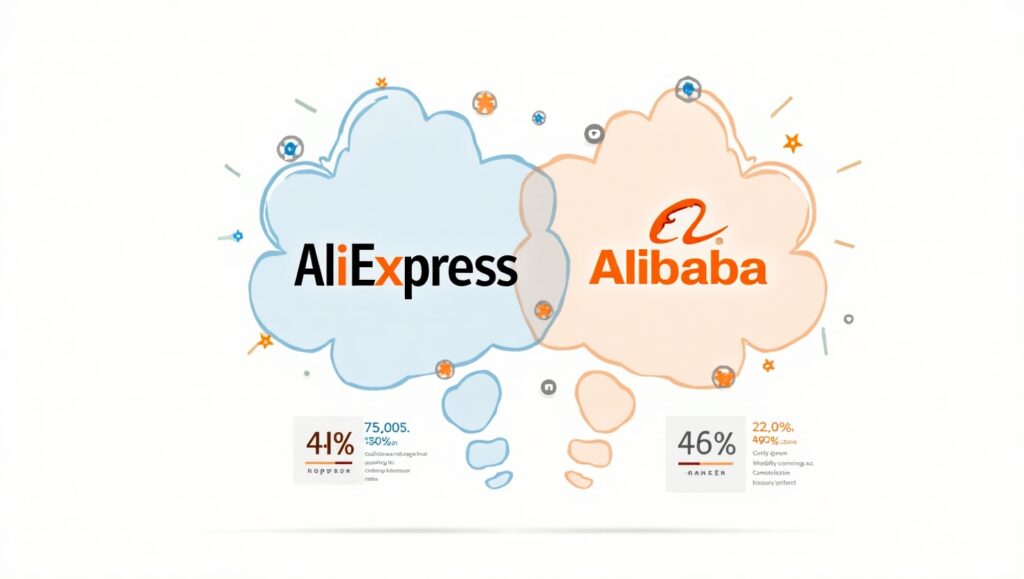
Purchasing Products
Products are purchased differently between the two platforms:
- Alibaba mandates direct communication between suppliers who must submit price quotes and negotiate retail-specific agreements.
- The checkout process on AliExpress functions like Amazon’s system, enabling users to add products to their cart and proceed to purchase right away.
Buyer Protections
Their buyer protections also differ:
- AliExpress customers receive refunds within 30 days.
- Alibaba buyers resolve disputes via Trade Assurance.
Behind the Brand: Is AliExpress Owned by Alibaba?
AliExpress functions as an integral subsidiary of Alibaba Group, whose main headquarters operates as a multinational conglomerate in Hangzhou, China. Jack Ma founded this company in 1999 and grew it to become a leading global e-commerce enterprise.
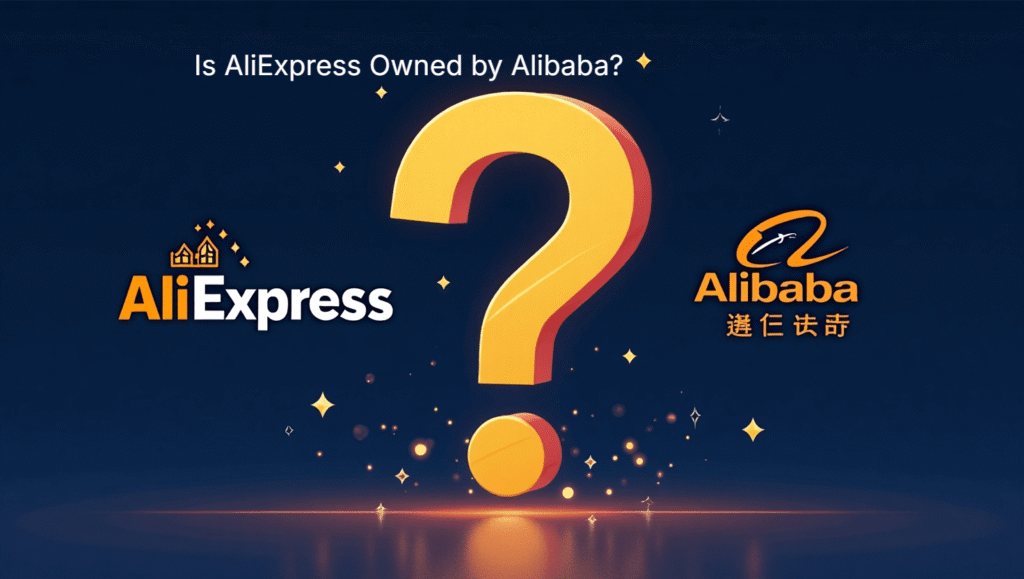
Alibaba Group’s eCommerce Ecosystem
- Alibaba.com – B2B platform for wholesale buying
- AliExpress – B2C platform for global consumers
- Taobao – C2C marketplace, mostly for China
- Tmall – B2C marketplace showcasing privileged domestic and global brands
- Lazada – Southeast Asia’s leading online shopping platform
AliExpress launched its business in 2010 to create an independent international market platform for Chinese sellers separate from Western services eBay and Amazon. AliExpress emerged as one of the five leading online shopping platforms in Russia, Spain, and Brazil.
Uncovering Ownership: Who Owns AliExpress?
Public ownership of Alibaba Group leads to a dispersed real ownership framework, even though it holds AliExpress as one of its businesses. Investors can find Alibaba Group shares traded on both the New York Stock Exchange and the Hong Kong Stock Exchange.
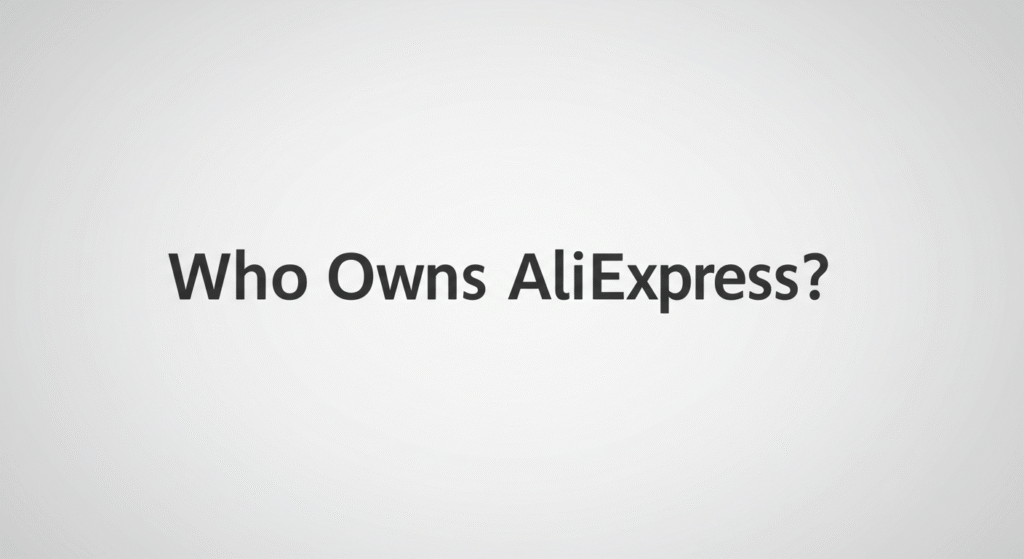
3 Key Facts About Ownership
- AliExpress operates as a subsidiary business under Alibaba Group, which functions as the parent holding firm based in China.
- The Chinese conglomerate Alibaba Group maintains equity ownership by major investment firms such as BlackRock, Vanguard, and SoftBank.
- Alibaba’s international e-commerce division manages executive operations for AliExpress and controls Lazada and Trendyol.
AliExpress maintains its Chinese roots while serving customers globally through its organizational setup. Alibaba’s combination of public and private ownership enables its forceful expansion plans.
Case Study: Global Penetration Strategy
In 2022, Alibaba allocated more than $7 billion toward logistics infrastructure improvements to enhance shipping speed to Europe and Latin America. Delivery time for many AliExpress products decreased to 5–10 business days across major regions such as Spain and Brazil.
Explained: Is AliExpress a Chinese Company?
AliExpress functions as a Chinese business through its Chinese ownership and operational management. It began operations in China in 2010 and still operates out of Hangzhou with shared management alongside other Alibaba-owned services.
Although AliExpress started in China, it has launched several campaigns to engage consumers from international markets. The site operates in more than 18 languages, while customer service works around the clock to serve shoppers from over 200 countries.
Chinese manufacturers and wholesalers represent the predominant sellers on this platform. AliExpress has incrementally included sellers from Turkey, Brazil, Poland, and Spain to provide quicker domestic shipping capabilities.
This hybrid approach gives AliExpress a unique edge: AliExpress sustains its Chinese origins while adapting its services to enhance global customer support.
Final Verdict: Should You Use Alibaba or AliExpress?
A business must consider both its operational needs and financial capacity when choosing between Alibaba and AliExpress. Consider order volume predictions and business methodology. Despite both platforms offering access to millions of products at competitive prices, their core use cases remain fundamentally different.
For Business Buyers and Entrepreneurs: Alibaba
Alibaba serves as the preferred platform for launching product-based businesses and establishing private-label products or running e-commerce brands. It offers:
- Significant reductions in unit cost through bulk purchasing.
- Customization options by stamping logos and packaging or adding unique characteristics.
- Connections with Original Equipment Manufacturers and Original Design Manufacturers.
- Direct supplier communication channels for negotiations and order samples.
Alibaba is ideal for:
- Wholesale importers
- Amazon FBA sellers
- Retail stores sourcing overseas
- Product developers and brand owners
New entrants to Alibaba will need to invest additional effort into managing communication with suppliers, quality checks, and international shipping logistics, which can present complexity.
For Individual Shoppers and Dropshippers: AliExpress
AliExpress is the perfect platform for casual shoppers and hobbyists, as well as dropshippers who wish to explore product concepts without large initial outlays. Here’s why:
- No minimum order requirement, allowing purchase of just one item.
- Built-in buyer protection system with effortless refund procedures.
- Compatibility with dropshipping platforms like Oberlo, DSers, and AutoDS.
- Quicker processing for global customers with an uncomplicated checkout process.
AliExpress is best suited for:
- First-time online entrepreneurs
- Dropshipping store owners
- Shoppers seeking affordable gadgets, fashion, and home goods.
- International customers can obtain direct-to-door delivery without customs handling.
AliExpress products tend to be more expensive per unit and offer limited to no customization options.
Cost Comparison Example:
| Platform | MOQ | Unit Price (Phone Case) | Custom Branding | Shipping Time |
| Alibaba | 500 | $0.50 | Yes | 15–30 days (freight) |
| AliExpress | 1 | $2.50 | No | 7–15 days (standard) |
Final Thoughts
Alibaba stands out as the better choice for long-term investment when your goals are business scaling, along with margin improvement and brand building. AliExpress provides a quick and secure opportunity for market testing, inventory avoidance, and affordable shopping.
Pro Tip: Some sellers exist on both platforms. If your AliExpress product test proves successful, you should search for the same supplier on Alibaba for bulk order price negotiations.
FAQs About Alibaba and AliExpress
This section responds to common queries about both Alibaba and AliExpress to eliminate any remaining questions:
Is it possible to use one account for both Alibaba and AliExpress platforms?
No. To access both Alibaba and AliExpress, you must create individual accounts with separate login procedures.
2. Which platform is better for small orders?
AliExpress is better. Buyers can make purchases of individual items without minimum order quantities and benefit from expedited processing times.
3. Are counterfeit products a risk?
Yes. Fake products and low-quality items may be found on both websites. Review seller feedback and confirm their certifications before making a purchase.
4. Can I dropship using AliExpress?
Dropshipping businesses depend on AliExpress products through the Oberlo or DSers applications that connect with Shopify stores.
5. What is Trade Assurance on Alibaba?
Alibaba offers Trade Assurance as a protection service for buyers. The program ensures refunds when delivery timelines are not met or goods fall short of quality standards.
Comparison Table: Alibaba vs. AliExpress
| Feature | Alibaba | AliExpress |
| Business Model | B2B | B2C |
| Target Audience | Businesses, Wholesalers | Consumers, Dropshippers |
| Minimum Order Quantity | Yes | No |
| Buyer Protection | Trade Assurance (limited) | Strong refund policies |
| Payment Method | Escrow, Wire Transfer, PayPal | Credit Card, PayPal, Klarna |
| Customization Options | OEM/ODM Supported | Rare |
| Shipping Method | Freight, Air, Courier | ePacket, Standard, Local Postal |
| Shipping Time | 2–6 weeks | 7–20 days (on average) |
Conclusion
In summary:
- Is Alibaba the same as AliExpress? No. The main roles they serve and their target users differ entirely.
- Is AliExpress the same as Alibaba? Still no. AliExpress is B2C while Alibaba is B2B.
- Is AliExpress owned by Alibaba? Yes. The Alibaba Group operates AliExpress as one of its most significant worldwide platforms.
- Who owns AliExpress? Alibaba Group Holding Ltd operates as a public company which has investors from around the world.
- Is AliExpress Chinese? Yes. AliExpress runs its operations from China but serves customers worldwide.
Understanding the variations between these platforms regarding their scope, structure, and purpose allows you to enhance your purchasing choices for business sourcing and personal shopping.

